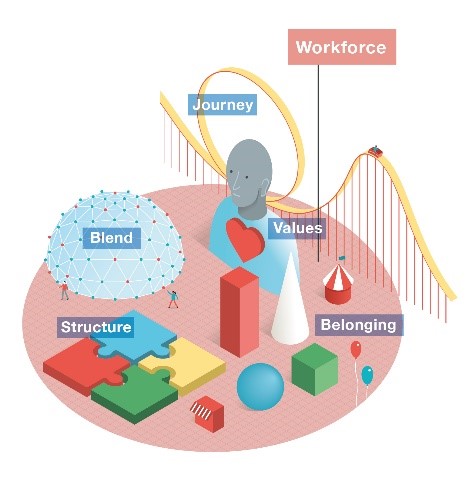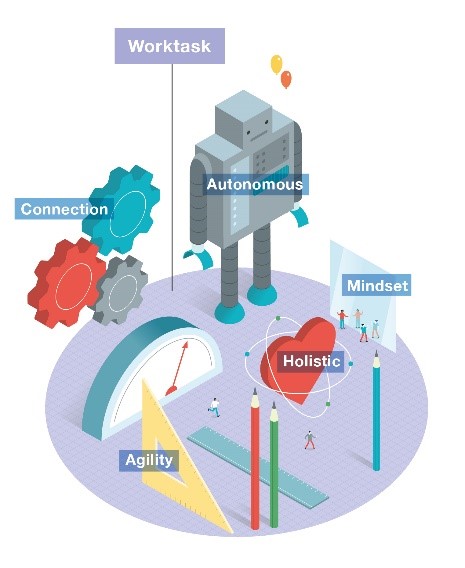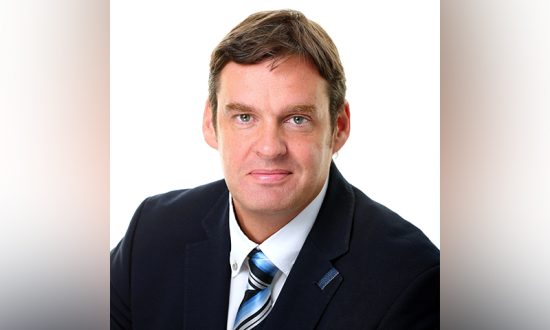Barry is Chief Strategy Officer of Cpl Group & head of the future of work institute. He is a thought leader on the future of work, strategic design, and business creativity. Over the past 25 years he has worked globally with some of the world’s most respected organisations and is a frequent author and speaker at numerous client and external events. As head of the future of work institute Barry leads a multidisciplinary team working globally to question, explore and design future work solutions with organisations. So, he isn’t just a speaker but is actively pushing the frontiers of the future of work every day in the real world.
The future of work for organisations is a story not yet fully written but there are enough plotlines to point towards a broadly defined first draft.
Things look vastly different in the world of work. At a global level businesses and governments alike are dealing with the great crises of our time – Covid 19 and the environmental catastrophe. At a business level the very essence of what ‘work’ is, what constitutes a ‘job’ or what represents an ‘organisation’ is evolving at a rapid rate. Digital technologies are rewriting the rules of engagement and there are exponential challenges for organisations trying to attract and retain the best talent globally (being popularised as the Great Resignation or Great Evaluation). Whatever lens we look at the future of work through, it suffices to say that it means one thing for organisations: Seismic change. And, as with all change, there is an opportunity for organisations to strategically embrace it and to design for it.
From our research at the Future of Work Institute with over 100 participating organisations (and counting), we are starting to see a fundamental evolution in the value system of businesses towards a more human and societal centred model. (More than 57% of business are aiming to be more human centric and 80% more society centric in the next 5 years).
From a practical, actionable perspective more human means: demystifying technology and applying it in an ethical manner, pursuing flatter & more flexible structures, a deeper understanding of the human experience, a new approach to truly inclusive leadership and a focus on balance, inclusiveness, and authenticity.
Societal centred means thriving through being more inclusive and diverse, embracing circular practices, seeing caring as a key business asset, a renewed focus on total stakeholder engagement and being a responsible business with sustainability at core. As Declan Bogan, Engagement & Sustainability lead FOWI states “We need to fundamentally change all of our behaviours – consumers, societies and businesses. We need sustainability built in; we cannot wait any longer.”
The Three Future of Work Pillars
As leaders how can we start designing our organisations to be future fit now? These are the 3W’s that really matter- Workplace, Workforce & Worktask-when it comes to the future of work. Within these 3W’s there are several levers organisations can use to gain new collaborative advantages
- Workplace – Where the work takes place across physical and virtual space.
- Workforce – How the overall workforce is designed and managed.
- Worktask – The methods, tools and mindsets that deliver the work.

The Workplace: Flexible, Smart & Distributed
It is likely that we will see a greater harnessing of collaborative platforms, new forms of mixed, multi rich engagement tools, as well as a greater drive towards appropriate forms of flexible, distributed or hybrid working. It is also clear that a formalised approach to what the workplace is and what it means for employees will be a critical design component for organisations to consider in getting the most out of the physical-virtual opportunity. It is likely also that in some instances that some parts of the physical footprint of an organisation and its role may well need to be reconsidered.

We are already seeing several organisations harness a hybrid working model with many continuing to work from home while others utilise the office at intervals. From our research which sampled over 1000 employees a blended mix of in-office & at-home is the preference for 85% of those surveyed. For many organisations the physical workplace will remain as is, in manufacturing settings, for example. However, for others we may see a re-evaluation/re-imagining of the role of the physical office as a hub, club, a place for deep social collaboration, an experiential place, or an area where the important meetings need to happen. Perhaps it will become a “park and ride” for employees with an ability to be there from time to time and smaller offices becoming the norm (the Hub & Spoke). In saying this, how we mange people across these hybrid working models will continue to be a key consideration now and into the future.
The Workforce: Design, Experience & Care
There is no doubt we will continue to see a broadening of what the workforce is with a greater use of the blended workforce to access the best talent globally- everything from permanent employees to ‘hire by the hour’ knowledge workers Libby Kelly, Director of Cpl Technology says that “Clients are already looking to hire on a short term/ contract basis and looking further afield for candidates, this is only going to rise as leaders get better at managing people remotely.”

Organisations will have to place a greater emphasis on designing people propositions and purposeful employee experiences that are value lead and create a sense of care & belonging, harnessing appropriate platforms to create real engagement & meaning for employees. Aine Fanning, Director of the Talent Evolution Group at Cpl says “Employees across all generations are rapidly moving from traditional career paths to more experience led careers. To stay relevant, organisations need to be able to manage blended workforce models that strengthen their own strategic goals and the career journeys of independent talent”. It is likely that Leadership will need to evolve towards a more empowering, orchestration and coaching style coupled with a general move towards blended, self-managing teams allowing employees to experience a greater sense of ownership and autonomy along their career journey.
Some of the key challenges highlighted to us by leaders in managing virtual or hybrid teams included a lack of social connection, teamwork and camaraderie and long-term negative impacts on employee mental health. Elysia Hegarty, Associate Director and Wellness Lead at the Future of Work Institute highlights that “Workplace wellness needs to broaden and evolve if it is to fully support the future of work world. The future of wellness can have a strategic impact on both the business bottom line and the employee’s general well-being but it must be tailored to the needs of the employees and the organisation rather than a blanket one-size fits all approach.”
Work Task: Automation, Autonomy & Human Skills.
Automation and augmentation of people and associated tasks to deliver work is set to accelerate over the next 5 years according to our study. There are strong considerations for the importance of a conscious and ethical approach to technology. Given the evolving workplace as a much more dynamic physical-virtual place, it is worth considering the need for a future shift for teams to focus on work outcomes as opposed to work activities. A move towards work practices that enable a greater sense of ownership, community and collaboration are likely to see greater adoption- like agile and design centred approaches. As with technologies, pockets of units within organisations are already well on the way to adopting these practices but as such, they are not always evenly spread across organisations.
An increased importance on human & transversal skills will continue to emerge as we move into a more augmented future including stronger communication skills, self-awareness, self-management, team collaboration and an ability to adapt and understand new technologies. The global crisis has also resulted in a greater requirement for leadership at distance and in many organisations the skillsets needed to do so are maturing rapidly. From our research 67% of organisations rated evolved leadership and managerial skills as one of the top skillsets need for the future of work.

The future of work is a strategic leadership imperative and as such it is not something that is ‘owned’ by HR, or the People function. It should be driven and sponsored at the very top and viewed as a strategic opportunity for collaborative and competitive advantage. Given the current challenges & changes facing us surely now is the time to create exemplar future fit organisations and ignite the beacons for the next generation of work and talent. As Lorna Conn, Cpls Deputy CEO, states “the future of work is about how we find, recruit, manage & motivate the best talent. Ultimately it is talented teams who transform businesses and exploit change.”
It’s the popular thing to say that the future of work is already here- it’s not- but it is in a state of becoming- and it is up to us to harness the change and build something fundamentally better for our colleagues, customers, and communities alike. It offers a genuine opportunity to create collaborative advantage for those organisations willing to harness it. Let’s not squander the opportunity. Over to you.


